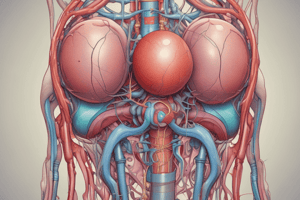Podcast
Questions and Answers
What is the primary function of the kidneys in the urinary system?
What is the primary function of the kidneys in the urinary system?
- Regulate blood pressure
- Filter waste products from the blood (correct)
- Store urine
- Produce hormones
Which component of the urinary system serves as a passageway for semen in males?
Which component of the urinary system serves as a passageway for semen in males?
- Ureters
- Bladder
- Urethra (correct)
- Adrenal glands
During which phase of micturition does the bladder relax and fill with urine?
During which phase of micturition does the bladder relax and fill with urine?
- Voiding Phase
- Filtration Phase
- Storage Phase (correct)
- Excretion Phase
What is the main function of the ureters in the urinary system?
What is the main function of the ureters in the urinary system?
What initiates a conscious decision to urinate in the voluntary phase of micturition?
What initiates a conscious decision to urinate in the voluntary phase of micturition?
Which phase of micturition involves the relaxation of the sphincter muscles to allow urine to exit the body?
Which phase of micturition involves the relaxation of the sphincter muscles to allow urine to exit the body?
What is a common symptom of Urinary Tract Infections (UTIs)?
What is a common symptom of Urinary Tract Infections (UTIs)?
Which health concern results from mineral crystal formations in the kidneys?
Which health concern results from mineral crystal formations in the kidneys?
What genetic disorder causes cysts to form within the kidneys and can lead to kidney failure?
What genetic disorder causes cysts to form within the kidneys and can lead to kidney failure?
During which phase of micturition does the bladder contract to push urine through the ureters?
During which phase of micturition does the bladder contract to push urine through the ureters?
Flashcards are hidden until you start studying
Study Notes
Unraveling Micturition: The Urinary System
Micturition, a term you might not have heard before, actually refers to the act of urinating – the process of releasing urine from the bladder through the urethra. As micturition is intimately tied to the urinary system, let's dive into the anatomy, functions, and components of this intricate network.
The Urinary System
The urinary system is a complex and crucial system primarily responsible for regulating the body's water balance, waste removal, and maintaining electrolyte homeostasis. This system includes the following main components:
-
Kidneys: These bean-shaped organs filter waste products, excess water, and electrolytes from the blood to form urine. They also regulate blood pressure and maintain acid-base balance.
-
Ureters: Tubular structures that transmit urine from the kidneys to the bladder.
-
Bladder: A hollow, muscular organ that stores urine until it is expelled from the body during micturition.
-
Urethra: A muscular tube that carries urine from the bladder and out of the body. In males, the urethra also serves as the passageway for semen.
-
Adrenal glands: While not technically part of the urinary system, adrenal glands produce hormones that influence kidney function, such as renin, which regulates blood pressure.
Micturition: A Step-by-Step Process
-
Storage Phase: The bladder relaxes and fills with urine. As the bladder expands, it stores urine until it reaches the capacity for comfortable voiding.
-
Sensory Phase: As the bladder fills, nerve endings called stretch receptors signal to the brain that it's time to urinate.
-
Voluntary Phase: The brain sends signals to the bladder and pelvic floor muscles, initiating a conscious decision to urinate.
-
Emission Phase: The bladder contracts, pushing urine through the ureters and into the urethra.
-
Expulsion Phase: Sphincter muscles at the base of the bladder and around the urethra relax, allowing urine to exit the body through the urethra.
Potential Complications and Health Concerns
Several conditions can impact the urinary system and micturition, including:
- Urinary Tract Infections (UTI): Caused by bacterial growth within the urinary tract, UTIs often lead to urinary frequency, urgency, and pain.
- Overactive Bladder: A condition characterized by frequent and sudden urges to urinate, often leading to urinary incontinence.
- Kidney Stones: Formations of mineral crystals within the kidneys that can cause severe pain and difficulty passing urine.
- Polycystic Kidney Disease: A genetic disorder that causes cysts to form within the kidneys, leading to kidney failure.
The urinary system is a complex and interconnected organ system that plays a vital role in maintaining overall health and well-being. Understanding normal micturition and the potential complications that can impact this system enables you to recognize signs of issues and seek appropriate medical care if needed.
Studying That Suits You
Use AI to generate personalized quizzes and flashcards to suit your learning preferences.




